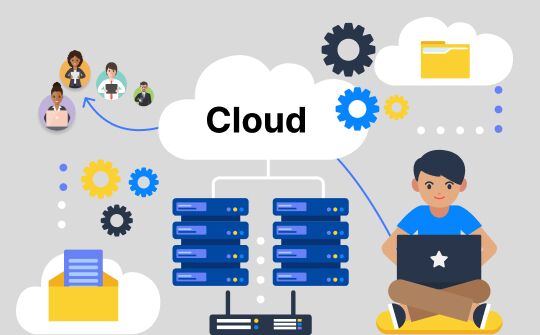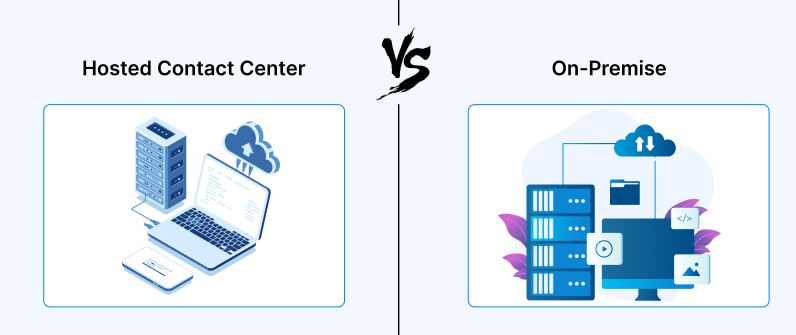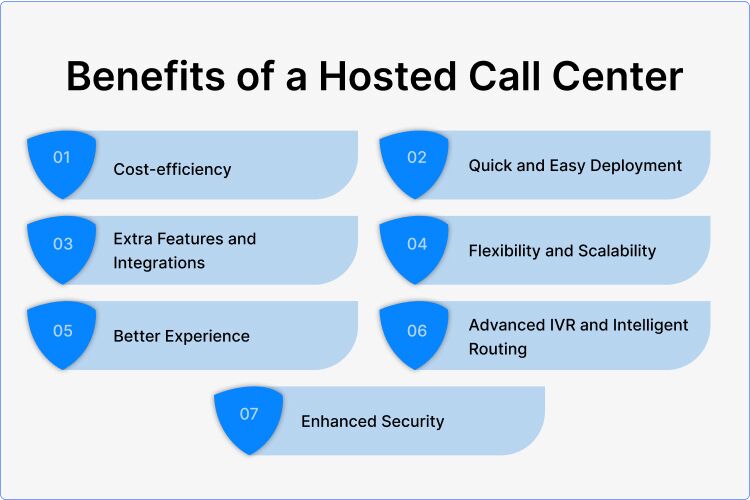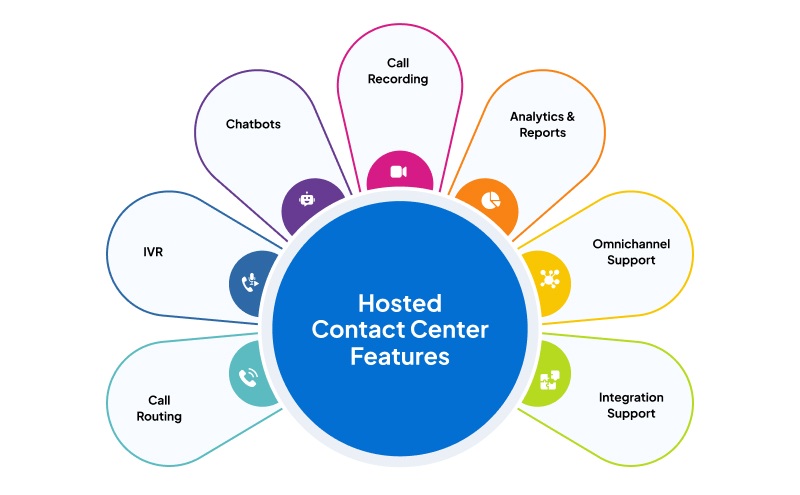
If your business handles a lot of customer calls, chats, and emails, you’ve probably considered how to make it all run smoothly. Let’s discuss a game-changing technology: hosted contact centers that make those customer service calls, sales chats, and support emails actually work smoothly.
Why do you think a call center is so crucial for businesses, first of all? A recent study shows that 40% of American customers stopped doing business with a company after poor customer support. 96% of the participants say that customer support is a crucial factor that affects their choices when considering a company to do business with.
In the dynamic customer service industry, the hosted contact center emerges as a game-changer, offering businesses a flexible, cost-effective solution to streamline communication and enhance operational efficiency. This article explores the insight of hosted contact centers, their benefits, and how they work in shaping the future of customer service.
First, let’s talk about what exactly a hosted contact center is—
What is a Hosted Contact Center?

It is a customer service solution that’s hosted by a service provider in the cloud. In simple words, hosted contact center solutions are operated and maintained by third-party vendors usually on dedicated off-site servers
Customers today expect seamless support across various channels, from phone calls to social media and messaging apps. Hosted contact centers empower businesses to meet these demands effortlessly.
Unlike traditional on-premise setups, which require substantial hardware and software investments, a hosted contact center operates remotely via secure cloud services. While the terms ‘hosted contact center’ and ‘cloud contact center’ are often used interchangeably, there’s a slight distinction.
A hosted contact center encompasses any solution hosted by a third-party provider, whether in traditional data centers or the cloud. On the other hand, cloud contact centers specifically refer to solutions hosted in the cloud, offering additional benefits like scalability and enhanced security.
Hosted contact center solutions eliminates the need for businesses to manage on-premise infrastructure, providing all the necessary resources for efficient customer service operations. With its flexibility, scalability, and remote accessibility, a hosted contact center emerges as a preferred choice for businesses seeking cost-effective and feature-rich customer communication solutions.
How Does a Hosted Contact Center Work?

A hosted contact center represents a modern approach to customer communication, shifting the call center’s hardware and equipment off-site, typically to the cloud. This allows businesses to swiftly sign up, download necessary applications, and begin utilizing contact center tools without the hassle of managing on-premise infrastructure.
Let’s break down the working process of a hosted contact center into 3 key sections:
- Remote Hosting
- Signup and Contact Center Access
- User Experience
Remote Hosting
Hosted contact centers are managed remotely by service providers, who store and maintain all hardware and equipment. Most providers utilize cloud-based solutions, known as Contact Center as a Service (CCaaS), ensuring seamless operation without the need for extensive on-premise infrastructure. Service providers establish secure connections, store call logs, and manage messaging conversation histories, offering efficient and reliable service.
Signup and Contact Center Access
Signing up for a hosted contact center is a streamlined process, typically completed within minutes by company administrators. Users are invited to join via email, and administrators can purchase phone numbers across various regions. Agents and supervisors can swiftly download the provider’s desktop application and log in, granting immediate access to communication channels and tools necessary for customer interaction.
User Experience
Unlike traditional call centers that primarily support voice communication, hosted contact centers offer multichannel and omnichannel solutions. This means customers can reach out through various touchpoints, including phone calls, emails, social media, and messaging apps.
Agents can seamlessly handle tasks across these channels, providing a cohesive and efficient customer experience. The user convenience offered by omnichannel solutions drives anticipated growth in this sector, reflecting its importance in modern customer service strategies.
How is a Hosted Contact Center Different from an On-premise Contact Center?

Hosted contact centers have much more potential than on-premise, at least for certain types of organizations. Let’s find out how a hosted contact center differs from an on-premise one.
Hosted contact centers and on-premise solutions differ significantly in their infrastructure management and operational aspects. These solutions are managed offsite by service providers, offer a cost-effective approach, with providers handling infrastructure, updates, and maintenance. This stands in contrast to on-premise setups, which require substantial investments in hardware and software onsite, resulting in higher upfront costs for businesses.
-
Enhanced Flexibility
Hosted contact centers boast remarkable flexibility, allowing businesses to adjust their operations swiftly according to fluctuating demands. This agility ensures optimized performance and resource utilization, enabling businesses to meet ever-changing customer service requirements effortlessly.
-
Improved Cost Efficiency
Hosted contact center solutions end up being more financially beneficial in the long term. They achieve this by doing away with the necessity for physical infrastructure, which in turn leads to significant savings in hardware expenses and space usage. Additionally, ongoing IT maintenance expenses are significantly reduced, allowing businesses to redirect financial resources to critical endeavors.
-
Streamlined Scalability
Scalability is essential for business growth, and hosted contact center solutions excel in this regard. Designed to scale efficiently, these solutions accommodate expanding needs without compromising performance, offering the necessary agility to expand without investing in additional infrastructure.
-
Seamless Integration
Hosted contact centers seamlessly integrate with various business tools, including CRM systems, streamlining workflows and enhancing the customer experience. This integration enhances efficiency and strengthens customer relationships, offering businesses a competitive edge in today’s dynamic market landscape.
On the other hand, on-premise contact centers are maintained within the organization’s physical premises, requiring them to manage and maintain all aspects of their infrastructure. They are typically more time-consuming and costly to implement, harder to scale, and have limited integration options compared to hosted contact centers.
In short, hosted contact centers offer businesses a more flexible, cost-effective, and scalable solution, freeing them from the burdens of managing on-premise infrastructure and empowering them to focus on core competencies and delivering exceptional customer experiences.
What are the Benefits of a Hosted Call Center?

Hosted call center solutions offer significant advantages to businesses across various operational aspects, driving efficiency, cost savings, and enhanced customer experiences. Let’s dive into the benefits provided by these solutions, shall we?
1. Cost-efficiency
Hosted call center solutions eliminate expensive upfront investments and ongoing maintenance costs associated with on-premise setups. With cloud-based infrastructure, businesses avoid costly hardware installations, resulting in significant financial benefits. Flexible pricing models allow businesses to pay for the exact services they need, optimizing budget allocation.
2. Quick and Easy Deployment
Hosted call centers require minimal time, resources, and effort to implement compared to on-premise solutions. Deployment can be achieved within days as businesses don’t need to set up their own hardware and data center facilities. Moreover, all upgrades and maintenance are handled by service providers, streamlining the management process.
3. Extra Features and Integrations
Cloud-based hosted solutions offer a wide range of advanced features that drive efficiency and quality customer interactions. These features include smart IVR, customizable routing, and built-in analytics. Additionally, seamless integration with existing business tools, such as CRM systems, enables personalized customer experiences and streamlined workflows.
4. Flexibility and Scalability
Hosted call center solutions provide greater flexibility and scalability, allowing businesses to quickly adapt to changing demands. Businesses can easily add or remove agents, features, and capabilities to meet immediate needs and drive sustainable growth. The pay-as-you-go model enables efficient resource management and rapid adjustments to increased call volumes.
5. Better Experience
Hosted solutions enable remote work, empowering agents to work from anywhere with an internet connection. This flexibility promotes a healthy work-life balance and enhances agent satisfaction, ultimately leading to better customer experiences. Moreover, improved technology and streamlined workflows contribute to faster query resolution and personalized interactions.
6. Advanced IVR and Intelligent Routing
Cloud-based hosted solutions offer advanced IVR capabilities and intelligent call routing, allowing for efficient segmentation of voice traffic and faster responses. Interactive voice response (IVR) provides automated self-service options to customers, while intelligent routing assigns callers to agents based on configurable rules and criteria, optimizing resource utilization and enhancing customer satisfaction.
7. Enhanced Security
Reputable hosted service providers employ robust security measures to protect sensitive customer data and ensure regulatory compliance. The cloud-based infrastructure undergoes regular security updates and monitoring to mitigate potential threats. Enhanced security features, such as data encryption and access controls, foster confidence and trust in the call center’s operations for both businesses and customers.
Limitations and Challenges with Hosted Contact Center
We have learnt about the flexibility and scalability benefits offered by hosted contact centers for managing customer interactions, however, they do have their own limitations and drawbacks. Let’s understand these one by one:
- Limited Control Over Infrastructure, as the management of hosted contact centers is done by third-party vendors
- Vendor Lock-in may cause data migration issues when switching to other providers
- Trusting a third party for your data management may cause data privacy and compliance concerns
- Specialized integrations are often not a part of or are expensive in hosted contact center services
- Extra charges for advanced features and premium services might result in higher Total Cost of Ownership.
It is important to know that all the above-mentioned challenges can be effectively addressed and bypassed if you deal with a reputable, reliable vendor.
Who Should Consider a Hosted Contact Center?
If you are a business that deals with a high volume of customer interactions but doesn’t have the resources or want the hassle of managing costly and complex on-premise infrastructure, then hosted contact center solutions are for you.
Here, we are listing out some of the most common businesses that can leverage hosted contact center solutions:
- Small to Mid-Sized Businesses with limited IT staff and budget
- Enterprises or large businesses looking to outgrow legacy systems
- Remote-first companies with teams working across different time zones
- Marketing teams that rely on phone calls for lead generation and conversion
How to Choose the Right Hosted Contact Center?
Choosing the right hosted call center platform is a critical decision for businesses looking to enhance customer service, streamline operations, and drive growth. To ensure you pick the right solution for your business, follow these steps: Consider how you communicate, which features you require, how you’ll deploy it, your budget limitations, and feedback from users. By taking a methodical approach to evaluating hosted contact center solutions, you can identify the best fit for your organization and unlock the full potential of your customer engagement strategy.
Before we move towards the steps to select the best solution, let’s look at the features your hosted contact center solution should have:
Important Features a Hosted Contact Center Should Have
When considering a hosted contact center solution, several essential features can significantly enhance operational efficiency and customer satisfaction.

ACD and Call Routing
Automatic Call Distribution (ACD) and call routing systems ensure efficient handling of incoming calls by directing them to available agents based on predetermined criteria. Skill-based routing, for example, matches callers with agents possessing the relevant expertise, improving first-call resolution rates and reducing average handle time.
Interactive Voice Response (IVR)
IVR systems facilitate self-service options for callers, enabling them to navigate through menu options using keypad entries or voice commands. This feature streamlines call routing, reduces wait times, and empowers customers to resolve simple inquiries without agent assistance.
Call Queue Management
Call queue management organizes incoming calls into queues when agents are unavailable, preventing dropped calls and enhancing customer experience. Queue callback options allow callers to request a callback instead of waiting on hold, further improving efficiency and satisfaction.
Chatbots and Virtual Agents
Integration of chatbots and virtual agents automates customer interactions through digital channels like live chat. These AI-powered tools provide 24/7 support, reduce staffing needs, and enhance customer satisfaction by offering prompt assistance and resolving queries efficiently.
Call Monitoring and Call Recording
Real-time call monitoring and recording features enable supervisors to evaluate agent performance, assess call quality, and identify training opportunities. Call recording ensures compliance, facilitates quality assurance, and provides valuable insights into customer interactions.
Real-time Analytics
Reporting and analytics tools offer insights into critical metrics and KPIs, empowering managers to make data-driven decisions. Real-time monitoring of key metrics such as average speed of answer, first-call resolution rate, and customer satisfaction scores allows for proactive adjustments to optimize performance and customer satisfaction.
Omnichannel Communication Support
Omnichannel support enables businesses to engage with customers across multiple channels seamlessly, including voice, email, SMS, live chat, and social media. Consolidating customer interactions into a unified platform enhances efficiency, consistency, and customer satisfaction across channels.
CRM Integrations
Integration with CRM systems centralizes customer data and interactions, empowering agents with a complete view of customer history and preferences. Seamless access to CRM data enables personalized interactions, improves issue resolution, and enhances overall customer experience.
These features are integral to a comprehensive hosted contact center solution, providing businesses with the tools and capabilities needed to deliver exceptional customer service and drive operational excellence. When evaluating hosted contact center software or platforms, prioritizing these features can ensure that your organization meets its customer service goals effectively.
Consider the following steps before choosing a hosted call center:
- Consider deployment: Decide on a hosted contact center based on workforce and office setup. Assess agent needs and workflow for the best fit.
- Set budget: Establish a monthly spending budget per agent. Compare pricing plans, considering features and scalability.
- Take trials: Request free trials from top providers to evaluate platforms. Engage agents to test usability and assess feature value.
- Read reviews: Research online reviews and seek peer recommendations to gauge user experiences. Consider reliability, ease of use, and support.
- Evaluate security: Prioritize data security with providers offering robust encryption and compliance. Ensure protection against breaches and unauthorized access.
- Check reliability: Choose a reputable provider with high uptime for consistent service availability and uninterrupted customer support.
- Assess integrations: Check integration capabilities with existing systems like CRM platforms for streamlined workflows and centralized data.
- Evaluate support: Verify accessibility and responsiveness of customer support. Ensure comprehensive training and timely issue resolution.
- Consider future-proofing: Look for providers offering AI integration and predictive analytics for enhanced customer interactions and personalized experiences.
- Review pricing: Understand pricing structures and total cost of ownership. Consider additional charges for integrations, support, and training.
- Prioritize user experience: Choose a solution with an intuitive interface to promote productivity and minimize training. Ensure efficient operations and agent satisfaction.
By following these steps, you can effectively assess your requirements, explore available options, and choose a hosted contact center solution that meets your business objectives and delivers exceptional customer experiences.
Best Practices to Set Up Hosted Contact Center Software

Set Your Business Goals and KPIs
Before you jump into using a contact center solution, first figure out the areas that you are trying to improve. It can be your customer support service speed or your sales outreach, or even both. After that, identify the KPIs that matter the most – FCR, AHT, CSAT, and more.
Choose A Vendor that Fits Best With Your Needs
Again, we emphasize the importance of choosing the right vendor because all solutions are not created equal. Consider parameters like quality of support, ease of integration, compliance, scalability, and pricing flexibility to make your choice.
Plan Your Call Flows & IVR
Be logical when doing this because a well-designed IVR can make a whole lot of difference in customer experience. Your menu should be short and clear. Keep the commands customer-centric and always provide the option to speak to an agent so that callers do not leave out of frustration.
Set Up User Roles and Access Controls
To ensure the security, accountability, and prevent accidental system-wide changes, you need to set up roles for your agents, superwisors, and admins. While agents can only have access to call handling and taking notes, supervisors can monitor calls and access reports as well. Admins usually have access to system-wide settings.
Integrate with CRMs and Other Tools
To sync data and automate workflows, integrate your hosted contact center solution with your CRMs, Helpdesk software, and applications that you use for communication.
Enable Call Recording and Analytics
From the day you start using the solution, make sure to enable the call recording feature along with call analytics. While call recording helps in monitoring agent performance, identifying training opportunities, and resolving disputes, analytics provide real-time insights into call data. This includes call volume, resolution rates, and customer sentiment.
Set Up Notifications and Missed Call Alerts
Customers don’t like to be ignored. Therefore, ensure that your hosted contact center system is configured for real-time alerts on missed calls, unanswered voicemail.
Future Outlook: Hosted Customer Service

One of India’s leading telecom service providers was facing a sudden increase in customer interactions during and after the COVID-19 pandemic. To address these challenges, they adopted a cloud contact center solution. As a result, they achieved 99.99% uptime with no voice delays despite high traffic volumes. Additionally, they enhanced customer satisfaction by offering 24/7 customer support on social media platforms, ensuring continuous accessibility for their customers. Source
This real-world example clearly shows how the future of hosted customer service is going to be. With advancements in AI-powered tools, cloud-hosted call centers will revolutionize customer interactions. Virtual agents, sentiment analysis, and predictive analytics will become standard, elevating customer service to new levels. With the rise of remote work and global operations, hosted contact centers will play a vital role in ensuring seamless customer experiences across borders.
Last (but not the least) Words
I’ve explained above how impactful and crucial a hosted contact center can be, especially for a future-oriented customer service setup. With a focus on scalability, security, and user experience, businesses can leverage these solutions to enhance customer satisfaction and operational efficiency. Do not forget that the future of hosted customer service lies in innovation and adaptation to meet evolving demands, enabling businesses to stay competitive and deliver exceptional customer experiences.
Frequently Asked Questions
Can I record calls using hosted contact center software?
Yes, hosted contact center solutions come with an in-built call recording feature.
Can small businesses benefit from hosted contact center solutions?
Yes, hosted solutions are often scalable and affordable. This means small businesses with limited resources can use them with ease.
How long does it take to set up a hosted contact center solution?
Typically, it takes a few hours or a few days, depending on the complexity of the system.
Can hosted contact centers be scaled?
Yes, you can add or remove agents based on your call volume and requirements.
How can hosted contact center systems help with missed calls?
Features of hosted contact centers, like missed call alerts, voicemail-to-email, call queues, and automated callbacks, can help prevent lost leads.






















